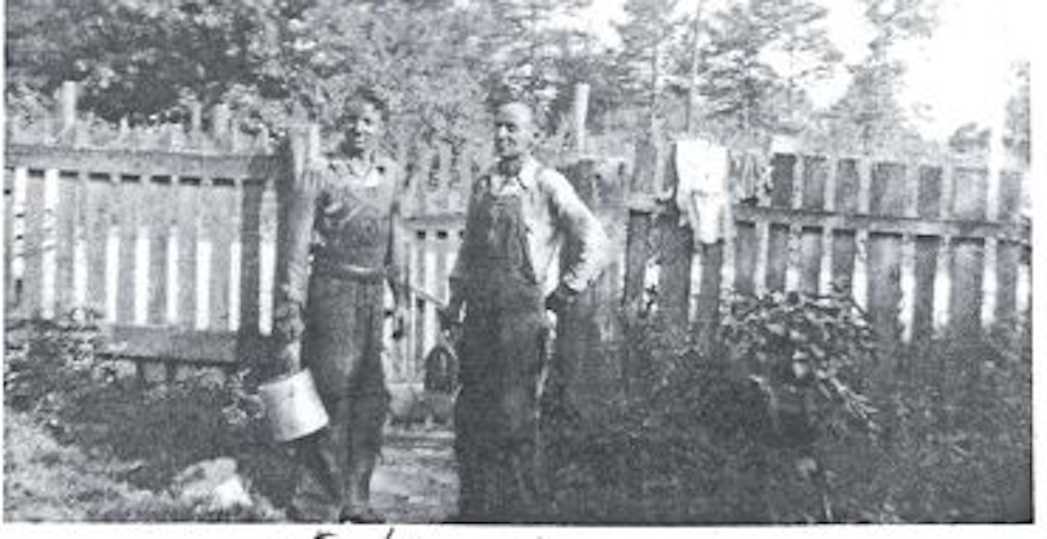Edward Shook, the subject of this essay, died in his sleep at home in McCreary County, Kentucky, on November 16, 2017, the birthday of his late wife, Orene. He was 82.
A version of this essay originally appeared in our January 2015 issue under the title "Still Here."
Cover photo: The only remaining photo of Edward Shook (left, age 18) and his father together in their mining gear.
Papaw leans forward on his kitchen stool, fishing cap blocking the scant light from the window. He thumbs his suspenders, looks at the blank white counter as if the picture might appear. It is 9 a.m., and he is tired. Would have been outside with tools in his hands a year or two ago, even though he retired after Mamaw died in 2001. He woke at 5 a.m. for about 60 years, working mines, factories, construction, cars, tractors, then his own land. “Makes you feel good when you get your ass outta bed,” he likes to say. But for the past few months, he’s rolled out of bed at 10 or 11. Today is the earliest he’s been up in a long time. Today, we’re looking for something.
The only photo of my grandfather and his father together in their coal mining gear is gone.
“Somebody must have took that picture,” he says. He saw it on the porch at his brother Wayne’s hog roast in September, but Wayne says he doesn’t have it. Papaw’s chin sinks down into his green flannel shirt. He went to the dermatologist last week. Looks like cigarette burns all over his face, even inside his ears. Dr. Knuckles singed the cancer from his skin, left it in his bones.
It’s been weeks since I’ve visited McCreary County, my formerly coal-mining homeland in the Big South Fork National Forest on the Tennessee border. Months since I’ve been to Papaw’s house at the end of Lick Creek Road. Didn’t eat any of his peaches this year. I’ve missed the way fog gathers in the hollers — bowls of breath. Mamaw and I used to pick muscadines in the morning haze. I’d reach into brush without looking, branches scratching my fingers, and tug out a palmful of the big, smooth, shining grapes. Mostly I’ve missed wood stoves. Papaw’s house is an oven. Central air, gas, electric — they’ll keep you warm, but wood heat gets inside you. Wood heat smokes into your gut and makes your nose flake and bleed when you wake. Sweat collects on my collar, but Papaw keeps his hands in his pockets. The fire doesn’t keep him warm anymore.
The gray sky spills rain over the stripped winter woods. Mom tries to get Papaw to wear a scarf, protect his face. Mamaw had neuralgia; she always wore a scarf outdoors. But Papaw won’t; he’ll tough it out. When we open the door, it feels like surfacing from bathwater. Papaw puts a hand on his knee to get over the doorstep and huffs a little cloud of air. It hangs there, warm and real, then disappears, leaving no sign that he stood breathing.
Mom drives us past the ghost of McCreary County’s founding industry. The old Stearns Coal and Lumber Co. building still stands near the train depot. Blue Diamond Coal bought out Stearns in the ’70s, and ceased all McCreary County operations by 1987. Stearns buildings became shops, restaurants, event spaces that still sport the green and white company colors.
Gray plastic wraps the front of Store One like a bandage. Half the place burned down after the Independence Day fireworks show a couple years ago. Firemen stretched out over the blaze, their ladders like stacks of toothpicks. The whole county came to watch, blocking the street with cars — there’s rarely a reason to parallel park here, and quite a few lifetime residents were evidently out of practice.
But no one was leaving, anyway. Quite the opposite: A few people ran into the smoke to grab old mining gear. “Our heritage,” said an elderly woman, weeping into her son’s shoulder as the smoke climbed higher.
We pass more green and white buildings, headed toward Cooperative, a former McCreary County town where Papaw worked in a mine in the early ’50s. “Co-op” for short. Papaw has Mom turn off the route onto a one-lane road. “Where are we going?” I ask. No one answers. Trees curve up and over the road like a rib cage. Ahead, a green gate hangs half-open, so we drive through. The Barthell Coal Mining Camp appears through the woods.
The old tipple looms from the hillside, wooden walls streaked with black stains. Papaw opens the car door before Mom can stop. Richard Koger steps out from the information center, shows us around the camp. His parents, Sonny and Marilyn, bought the place from Stearns in 1984. Koger says his family rebuilt the camp based on information from a University of Kentucky archival study. He assures us that everything is accurate, exactly as it was. The original metal dentist’s chair and embalming table — dentists used to be undertakers, too — sit in the replicated doctor’s office. The Kogers even rebuilt the mine entrance. Fifteen bucks for a tour, 300 feet underground. You can rent the “company houses” for a week at a time. Authentic, musty, bare wood. Nevermind the air-conditioning, the piles of Nora Roberts novels, the kitschy ceramic miner figurines. Koger’s got to pay the insurance somehow.
Papaw waves his McDonald’s sausage biscuit around as he talks, dropping crumbs to the ground. “I was a coupler,” he tells Koger.
“You’re lucky you have all your fingers and hands,” Koger says.
Papaws looks down at a rust-covered mining car. It’s a “motor,” a railcar that pulled carts of coal. He eyeballs the weight, gets it right: eight tons. As a coupler, he connected carts to the motor. He stood between tons of steel and stone, leaping out of the way when they came together.
Koger leads us into the mine. Darkness covers Papaw’s face. He breathes deep. Clay, sulfur. Coal veins run through the walls. A wire snakes along the ceiling, powering far-apart lamps. Bare wires ran through the mines in the early ’50s. Papaw used to bend metal coat hangers into hooks and toss them over the wires, dropping cheese on the ground near the dangling metal — 750-volt rat trap.
Three hundred feet in, we find a “pillar,” a wall left untouched to prevent cave-ins. Papaw’s voice echoes through the mine, bright and easy, like a younger man’s. “When we didn’t have enough coal, we’d mine the pillars, too. Called it ‘robbing,’” he says. When they dug too much, the weight of the world sent stones bursting from walls. Support beams exploded, impaled men.
My great-grandfather, who became a miner at 14, drove the motor. Fans pushed clean air through side entrances, so miners kept the front doors closed to keep oxygen inside. But it was a big hassle to stand around waiting for them to open when the motor came through. So my 18-year-old papaw would sit by his dad on the front, against regulation. When they got close to the doors, he’d jump off, run ahead, open them and then hop onto the back cart to ride out. The trains were so long that he couldn’t see his father up front. “Can you hear me?” he shouted once. No one answered, but his voice resounded. It sounded like it would vibrate forever, safe from time in the earth.
Papaw looks up at the ceiling. Only his bifocals catch the dim lamplight. “It’s always good and warm down in the mines,” he says.
There is nothing left. Co-op is empty of civilization. Trees rut through the fog like exposed bones. Papaw points through the wet windshield. There was a house there, a school there. A church, a store, a baseball diamond. There are no crumbling ruins. There are no flat spaces on the ground. Just woods. Oaks, maples, a family of opossums in the underbrush. The town didn’t wither when the coal ran out in 1958, as all coal will — it vanished. Only Barthell and government-owned parks remain, none of them in Co-op.
Mom turns the car down a long driveway. Papaw grins at the brown stallion tossing his mane in Wayne’s barn. Wayne steps out and waves at us from the front porch. We know he doesn’t have the photo, but we can talk, remember.
“I found that picture,” he says.
Well, Hell.
In the kitchen, Wayne opens an old scrapbook lined with lace. Not there. “Well, I know I had it,” he says. Papaw leans forward over the old photos. “We went way up in that mine at Barthell,” he says.
Wayne nods. “Well.”
They keep looking through the scrapbook. “It’s here, it’s got to be,” Wayne says.
“I’m sure it’s here,” Papaw says.
Wayne hauls out scrapbook after scrapbook. Four, five, six stack on the kitchen table. “It’s got to be here,” he says. But then he stares out the window and goes quiet. Mom turns a page without looking.
There it is. My 18-year-old grandfather smiles, face covered in coal dust, a lunch pail dangling from his fingers. His father stands beside him, casual as a maple tree in his overalls, his gaze fixed on something beyond the frame. Papaw holds the black-and-white photo flat on his palm. The only picture of him and his father in the vestments of their labor is wrinkled, frayed at the edges. The only picture of him and his father in their mining gear is still here.
He looks up at his brother. “Bud,” he says, “thank you.”
On the porch, Papaw hunkers down to pet a fat old beagle. He doesn’t hold his knees, he doesn’t grab his aching back. He just squats, goo-goos at the dog’s droopy face, smiling at her red eyes like the two of them are in on the same secret. “She a good runner?” he asks, joking.
“Well, she did used to be,” Wayne says, lighting up a no-filter smoke. “I killed hundreds of rabbits with her. Can’t kill her. She’s been hit three times.”
Last time was several years ago. Papaw’s younger brother, Dale, was steering down the driveway with Wayne riding shotgun when his truck bounced. Recognition settled cold in his stomach. “Damn,” he said.
The dog lay on its side, one ear flopped backward over her head. Wayne jumped from the passenger’s side and picked her up by the hind legs. She swung like a pendulum in a grandfather clock. Blood poured from her nose and soaked into the gravel. Wayne tossed her into the truck bed and dug a little grave behind the house. But when he walked back to retrieve the body, he heard scuffling. The beagle sat up, wagging her tail, panting in the cool air. She barked a little cloud of breath, jumped to the ground and took off down the driveway like she was looking for something. Dust rose behind her as she bounded over her blood, headed home.



